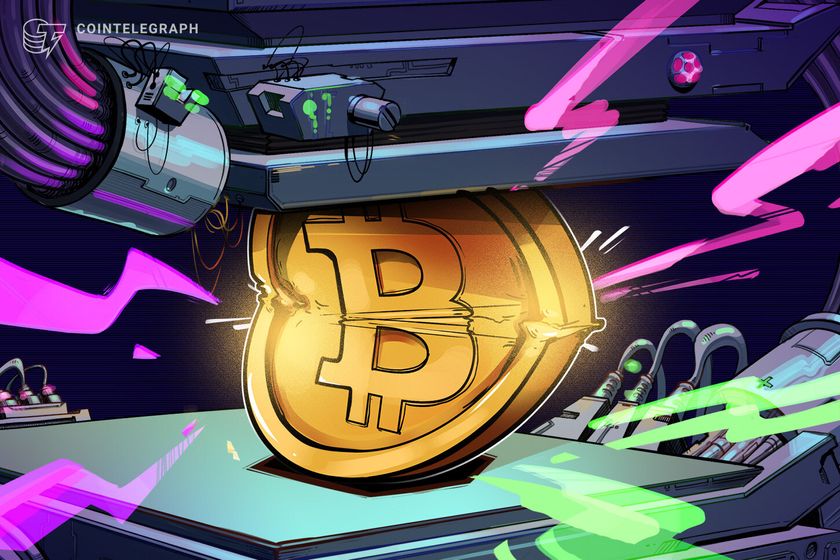Governments truly wanting to “beat Bitcoin” may carefully consider siphoning the value gained through bitcoin.
I think at the end of the day if it’s really successful, they will kill it and they will try to kill it. And I think they will kill it because they have ways of killing it. -Ray Dalio on Bitcoin
Banning Bitcoin is a practical impossibility. The incentives are such that Bitcoin will prevail in the long term as the savings technology of choice, but that doesn’t mean the state will give up its power as a monetary monopolist without a fight. The brighter minds among the ruling class will attempt to emerge undefeated from the upcoming turbulent times.
Government Bans Don’t WorkOne of the best definitions of the state was formulated by Max Weber, calling it entity that has “a monopoly on violence.” The state uses this monopoly to further entrench and strengthen said monopoly, with the goal being to attain more power over society. Direct state monopolies have been pretty much discredited by economic disintegration whenever tried throughout history. So the modern approach for the state to control various industries is to do it indirectly. Two popular ways to achieve indirect control are to either ban the particular industry or to steer it via a combined force of taxation, regulation and surveillance.
Bans aren’t very effective. The history of major bans is a testament to the futility of banning an activity or resource that has strong demand.
The U.S. alcohol prohibition that was in effect between 1920 and 1933 is a prime example. A research paper from 1991 summarizes its effects as follows:
Although consumption of alcohol fell at the beginning of Prohibition, it subsequently increased. Alcohol became more dangerous to consume; crime increased and became "organized"; the court and prison systems were stretched to the breaking point; and corruption of public officials was rampant. No measurable gains were made in productivity or reduced absenteeism. Prohibition removed a significant source of tax revenue and greatly increased government spending. It led many drinkers to switch to opium, marijuana, patent medicines, cocaine, and other dangerous substances that they would have been unlikely to encounter in the absence of Prohibition. -Mark Thornton: Alcohol Prohibition Was a Failure
The War on Drugs, which began in the 1970s, saw similar results. According to a 2017 Cato Institute analysis, these are the effects of 50 years of drug prohibition:
Overdose deaths increased from 1 per 100,000 in 1971 to 12 per 100,000 in 2008.Drug potency increased, with consumption shifting from softer drugs like marijuana to hard drugs like opioids. New synthetic drugs such as crack cocaine and fentanyl emerged with a devastating effect on its users and their communities.Enforcement costs taxpayers $50 billion annually; the initial budget approved in 1972 for drug-related policies was $1 billion for a three-year program.The 50-year war gave rise to ruthless Mexican drug cartels and aviolent government response — the Mexican drug war itself has claimed an estimated 300,000 lives since 2006.A policy known as civil asset forfeiture became normalized, under which enforcement agencies can seize any assets belonging to a drug-related suspect. The amount of such seizures is staggering: “In total, the Department of Justice’s Asset Forfeiture Fund confiscated nearly $94 million in assets during 1986, its second year of operations. By 2011, this number had ballooned to approximately $1.8 billion [annually]. State and local seizures have followed similar trends.”Other consequences include police militarization, widespread corruption, increased oppression of minorities and foreign military interventions.The drug trade is also the main source of illicit funds and money laundering problems, similar to how illegal alcohol was the major source of illicit funds during the alcohol prohibition.
Now the purpose of this article isn’t to comment on alcohol or drug policy. The point of this rather lengthy introduction is to illustrate that government bans are ineffective when aimed at curbing activities that are in high demand. Wherever persistent demand exists, supply will, uh, find a way.
A classic line from Jurassic Park.Failed attempts at banning a particular industry gradually transform into the second type of state control: indirect, by way of taxation, regulation and subsidies. We have seen this development with the alcohol industry and the same is happening with the drug industry; cannabis use and trade is already legal in 18 US states and all types of drugs decriminalized in Oregon. The alternative to bans for the state isn’t to declare a free market, but rather to dominate via licensing requirements and to extract rent via taxation.
Are You A Good Citizen Or A Money Launderer?Contrary to what Ray Dalio thinks, it’s becoming clear by now that Bitcoin isn’t going to be banned in the way alcohol or certain drugs were banned. Governments, or rather experts in appropriate agencies, have done their homework. They know they can’t ban Bitcoin in any meaningful way.
There won’t be a war on Bitcoin. Not in the sense of an eradication attempt.
Instead, the state is going to go straight to indirect control, while it still can — before the process of bitcoinization reaches an event horizon, before the emergence of the bitcoin circular economy and widespread sats-based wages and before we can do away with fiat on-ramps.
Bitcoin itself cannot be banned but people interacting with it can be surveilled, prosecuted, fined or jailed. Plus, most of the massive value that bitcoin will generate over the coming years can be siphoned away from the holders. This can be done by dividing prospective bitcoin holders into two categories:
Good citizens: everyone wishing for bitcoin’s price exposure can do so in a compliant manner via exchanges and similar service providers. Good citizens don’t come in direct contact with the Bitcoin protocol and are discouraged from withdrawing bitcoin into their wallets. Transactions among regulated service providers are allowed; good citizens would be able to send bitcoin from Coinbase to PayPal, for example. Everything is fully KYC’d and custodied so the government has an easy time taxing away most of the value gains while the honeypot of personal data grows ever larger.Money launderers: direct interaction with the Bitcoin protocol is effectively illegal due to regulatory requirements that cannot be met on the individual level. Violators will have their bitcoin confiscated.I believe establishing such an environment is the dominant motivation for the cryptocurrency provisions in the recent U.S. infrastructure bill. As many have pointed out, the definition of “brokers” in the proposed legislation is technically ignorant and doesn’t take into account how the Bitcoin protocol works. Yet there was no will to acknowledge these shortcomings and bring the provisions closer to reflecting the technical reality.
The vagueness of this text means that everybody running their own node or mining on U.S. soil could potentially violate the law. The full text of the bill is available here, with specific sections on reporting for digital assets on page 2433.
I don’t think this is a case of incompetence. From the state’s point of view, a regulation of this kind isn’t a problem — it’s a solution.
The state isn’t aiming to have “regulatory clarity” (whatever that means), or to ensure consumer protection or to curb money laundering. The aim is to scare coders and businesses in the Bitcoin ecosystem into adopting bitcoin in an approved manner, via surveilled venues from which there won’t be any escape, and to siphon off the value that bitcoin will generate in the coming year, both from exchange-held IOU bitcoin and from sovereign bitcoiners.
Siphoning Off Bitcoin Value GainsAccording to a recent survey conducted by NYDIG, about 46 million Americans, or 17% of the US adult population, “own” bitcoin; it’s unclear how many of these simply have an account on Coinbase instead of truly holding bitcoin, but let’s assume that at least half of them hold their own keys (a very optimistic assumption). This would mean that less than 10% of the U.S. adult population hold any bitcoin.
If we further assume that bitcoin is going to keep on winning against fiat as a supreme store of value, it’s only natural that the majority of the American population will look to gain some sort of exposure to bitcoin in the coming years. And the way that this precoiner majority gets exposure is what’s at stake today. The state still has the chance to drive the majority into compliant walled gardens. It’s kind of similar to legalizing cannabis via regulated dispensaries, where everything is done in a regulated, recorded and thoroughly taxed manner.
The truth is that the majority of the population will be satisfied with having some exposure to bitcoin’s price, without having anything to do with Bitcoin the protocol. Most won’t even mind very much when the withdrawal process is greatly limited or disabled “for user safety.” The small minority of cypherpunk bitcoiners will be subject to prosecution, because they will always be in violation of the law — by running their node or mining without following the technically infeasible KYC requirements, or by developing or using an anonymous open source wallet.
Thus the state can siphon off most of the value that bitcoin will generate in the coming years.
Once the majority is captured in compliant walled gardens and the minority can be prosecuted at will, it’s pretty straightforward:
Bitcoin on exchanges will be subject to an annual unrealized capital gains tax. This may sound outrageous now, but there are ways to propagandize this into acceptance. We are currently heading into the greatest economic recession since the Great Depression. Everyone will be asked to do “their share” — and taxing half of the annual gain (in fiat terms) won’t be viewed as such a great sacrifice. The tax would be automatically deducted from the user’s account balance.Bitcoin held by sovereign hodlers would be subject to civil asset forfeiture — a process already widely used in the war on drugs and cheered on by good citizens. Everyone can choose to follow the law, after all. The End Game Is To Own As Much Bitcoin As PossibleIt’s fully plausible that people in the government understand the end game that hodlers play. Some might even be well-versed in the writings of Saifedean Ammous, Vijay Boyapati or Robert Breedlove. They know they have to do something, while also knowing that banning bitcoin is a fool’s errand. Embracing bitcoin in a compliant manner and scaring away people from a sovereign approach is the one shot the state has at surviving hyperbitcoinization.
The winning scenario for the state isn’t to ban bitcoin, but rather confiscating as much of it as possible and controlling the flow of the remainder. This doesn’t mean that all nation-states will do this; some will rather seek to attract Bitcoiners fleeing from those predatory regimes. It’s important to stay vigilant, hold your own keys, care about your privacy and be open to a scenario where relocation may be necessary in future.
This is a guest post by Josef Tětek. Opinions expressed are entirely their own and do not necessarily reflect those of BTC, Inc. or Bitcoin Magazine.

















